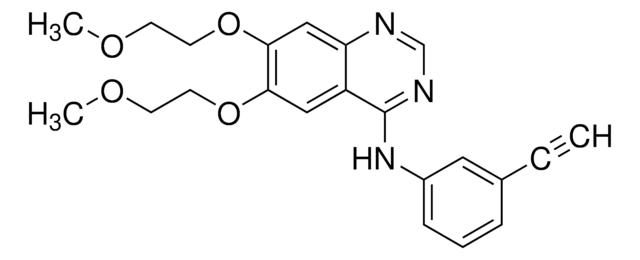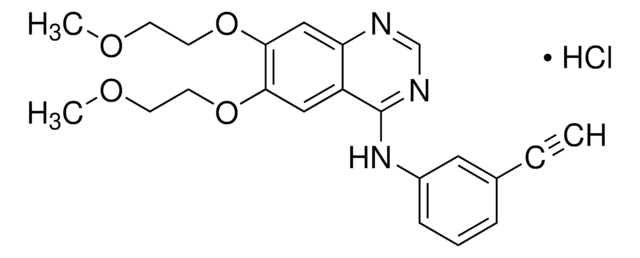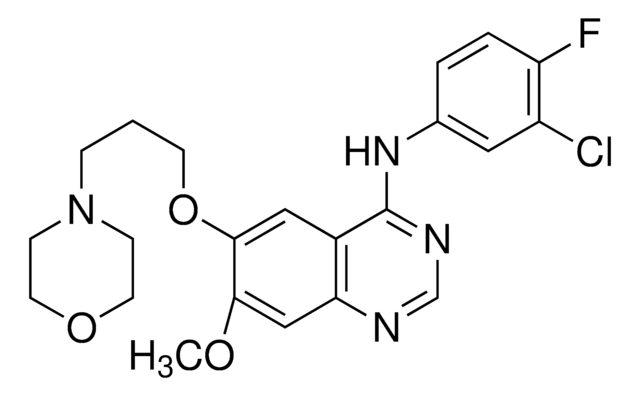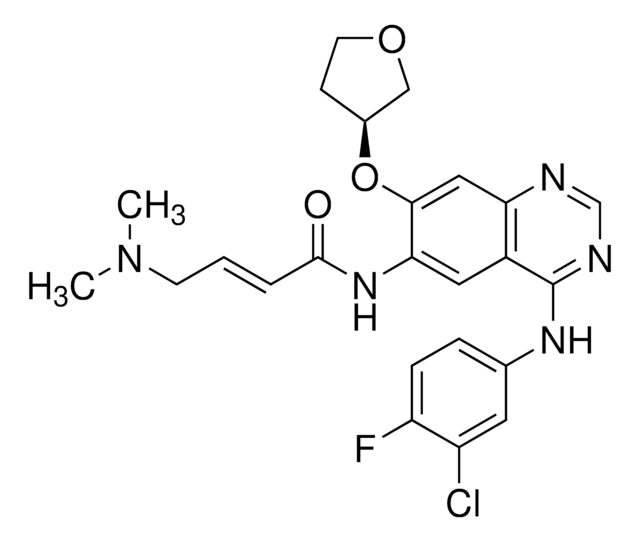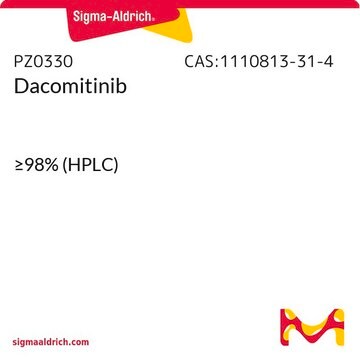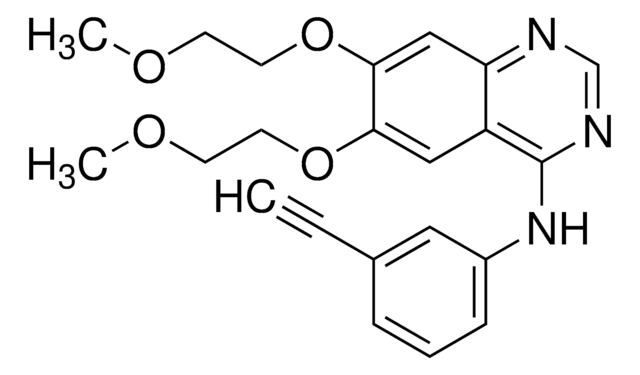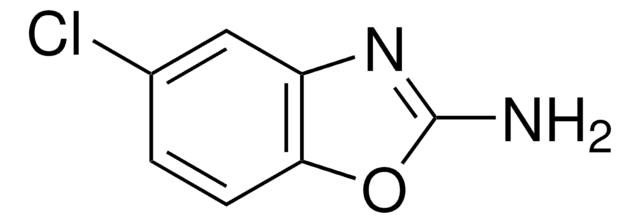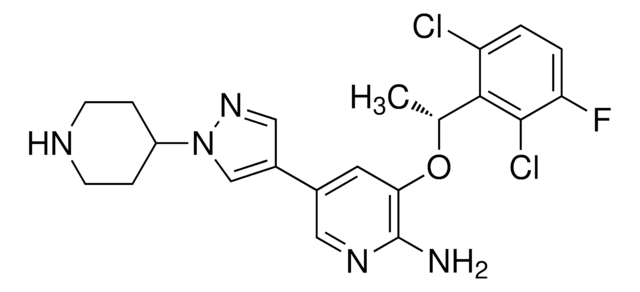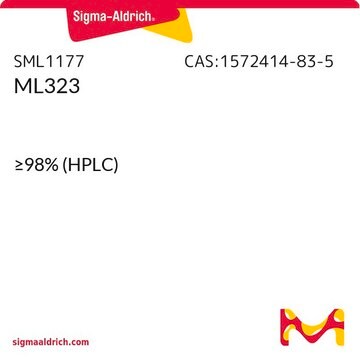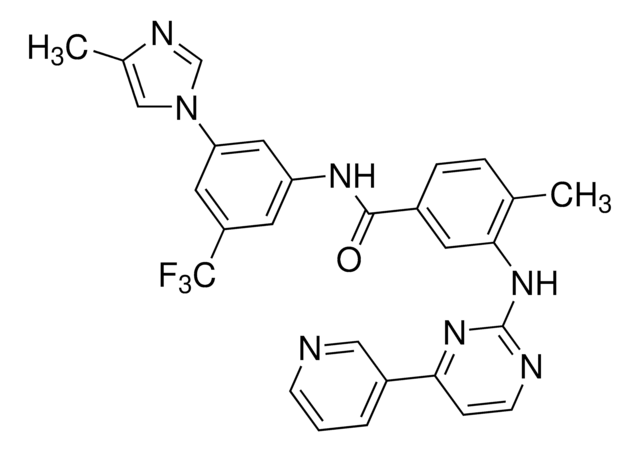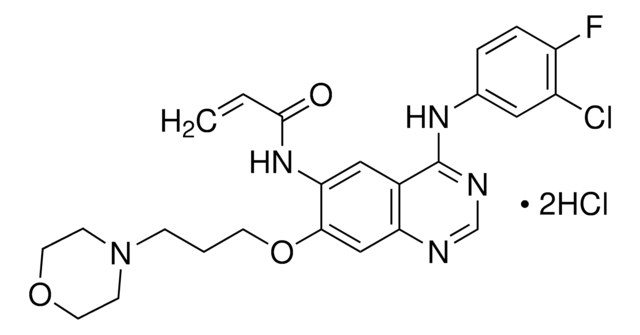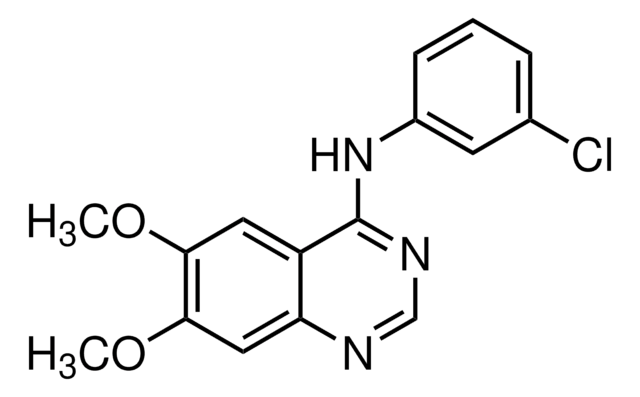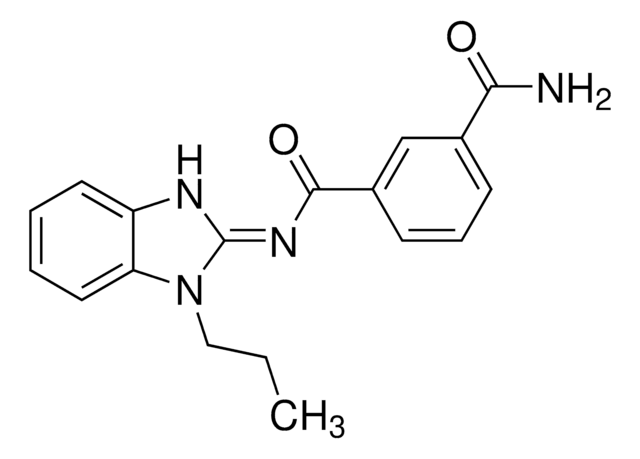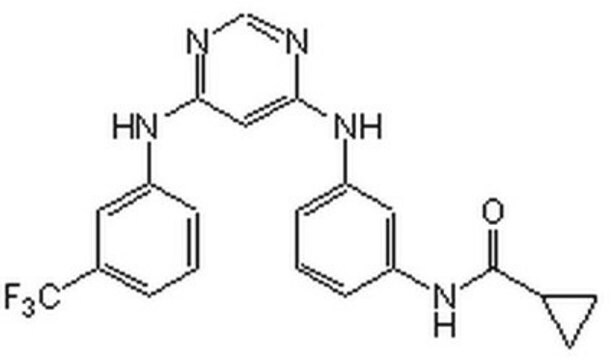SML2156
Erlotinib hydrochloride
≥98% (HPLC)
동의어(들):
774 hydrochloride, CP-358, N-(3-ethynylphenyl)-6,7-bis(2-methoxyethoxy)-4-quinazolinamine hydrochloride, OSI-744 hydrochloride
로그인조직 및 계약 가격 보기
모든 사진(1)
About This Item
실험식(Hill 표기법):
C22H23N3O4 · HCl
CAS Number:
Molecular Weight:
429.90
MDL number:
UNSPSC 코드:
12352200
NACRES:
NA.77
추천 제품
분석
≥98% (HPLC)
양식
powder
저장 조건
desiccated
색상
white to beige
solubility
DMSO: 2 mg/mL, clear (warmed)
저장 온도
−20°C
SMILES string
Cl.N(c3cc(ccc3)C#C)c1ncnc2c1cc(c(c2)OCCOC)OCCOC
InChI
1S/C22H23N3O4.ClH/c1-4-16-6-5-7-17(12-16)25-22-18-13-20(28-10-8-26-2)21(29-11-9-27-3)14-19(18)23-15-24-22;/h1,5-7,12-15H,8-11H2,2-3H3,(H,23,24,25);1H
InChI key
GTTBEUCJPZQMDZ-UHFFFAOYSA-N
관련 카테고리
일반 설명
Erlotinib hydrochloride is an antineoplastic drug. It regulates mechanistic target of rapamycin (mTOR) inhibition, epidermal growth factor receptor down-regulation and epidermal interstitial transformation (EMT) suppression.
애플리케이션
Erlotinib hydrochloride has been used to activate mitochondrial fragmentation in a human PANC-1 pancreatic cancer cell line.
생화학적/생리학적 작용
EGFR kinase inhibitor; Antineoplastic
Erlotinib hydrochloride is an inhibitor of the receptor tyrosine kinase EGFR (epidermal growth factor receptor). It is used clinically for the treatment of non-small cell lung cancer (NSCLC) and in combination for metastatic pancreatic cancer.
신호어
Warning
유해 및 위험 성명서
예방조치 성명서
Hazard Classifications
Acute Tox. 4 Oral
Storage Class Code
11 - Combustible Solids
WGK
WGK 3
Flash Point (°F)
Not applicable
Flash Point (°C)
Not applicable
가장 최신 버전 중 하나를 선택하세요:
시험 성적서(COA)
Lot/Batch Number
이미 열람한 고객
Kandasamy Saravanakumar et al.
Carbohydrate polymers, 245, 116407-116407 (2020-07-29)
The present work was developed the pH dependent-aptamer AS1411 (APT) decorated and erlotinib (En) loaded chitosan nanoparticles (CSNPs) for promising non-small-cell lung carcinoma (NSCLC) treatment. The characterization studies revealed that formulated APT-En-CSNPs were spherical in shape with size of 165.95
Analytical Methods for Therapeutic Drug Monitoring and Toxicology (2011)
Excessive mitochondrial fragmentation triggered by erlotinib promotes pancreatic cancer PANC-1 cell apoptosis via activating the mROS-HtrA2/Omi pathways
Wan J, et al.
Cancer Cell International, 18(1), 165-165 (2018)
Jorian D Hapeman et al.
Scientific reports, 14(1), 19980-19980 (2024-08-31)
Most cancer-related deaths are due to the spread of tumour cells throughout the body-a process known as metastasis. While in the vasculature, these cells are referred to as circulating tumour cells (CTCs) and can be found as either single cells
Rabea Oberthür et al.
Cancer letters, 407, 93-105 (2017-08-22)
Overexpression and activation of receptor tyrosine kinases (RTKs), such as the insulin-like growth factor 1 receptor (IGF1R) and the epidermal growth factor receptor (EGFR), are frequent phenomena in colorectal cancer (CRC). Here, we evaluated the effect and the cellular mechanisms
자사의 과학자팀은 생명 과학, 재료 과학, 화학 합성, 크로마토그래피, 분석 및 기타 많은 영역을 포함한 모든 과학 분야에 경험이 있습니다..
고객지원팀으로 연락바랍니다.